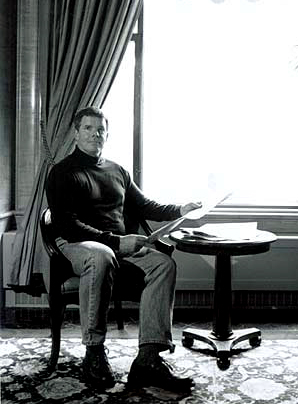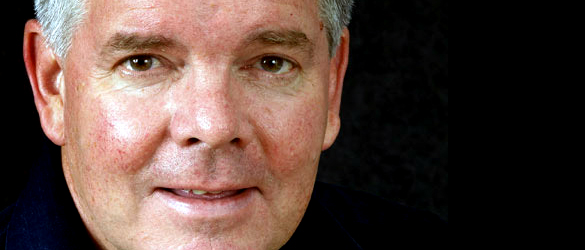Last week I was fortunate enough to catch George Bilgere for an interview. I recently gave a review of his captivating and unsettling book, The White Museum (2010). He has published five books of poetry, and received numerous awards for his efforts, including a Pushcart Prize for the poem “Graduates of Western Military Academy.” Bilgere resides in Cleveland, Ohio where he serves on the faculty of John Carrol University. I caught up with him on what was a beautiful morning in both Cleveland and Charlottesville, and the highlights from that pleasant and thought—provoking conversation lie below. I want to have a beer with this man.
GADFLY: Who have you been reading recently?
BILGERE: I just reread, because I was going to use it in a class, Tony Hoagland’s last book “Unincorporated Persons of the Late Honda Dynasty,” and I read Mark Halliday’s last book called “Keep This Forever.”
Just recently I have been reading Naomi Shihab Nye, partly because she is giving a reading here at John Carroll today, and so I need to be able to talk to her at dinner. I like her work quite a lot. Other than that, I just read a fairly recent book by Charles Wright called “Scar Tissue,” and like everybody else, I am crazy about Charles Wright.
GADFLY: Do you have any sort of heroes or all time favorite poets that you go to for inspiration or you consider a big influence on your work?
BILGERE: Yes, I do but obviously I don’t know if there will be any surprises. Pablo Neruda is a big deal to me because he continually opens my eyes to the possibility of metaphor. When I was a grad student, I studied in St. Louis in the early days of a writing program at Washington University with Howard Nemerov, and Nemerov was an early, really big influence on me. I worked hard to sound like Howard Nemerov. I loved his sort of neo—Augustan—classicism and his wit. All of that was really a big deal to me and was a huge influence for a long time before I kind of broke away from his kind of obscure formality into something that seemed much more natural to the person I am. I moved into much more kind of a poetic plain speak, but Nemerov was really an important figure to me for a very long time.
Somebody who really was important to me later in life was Tony Hoagland. Around the year 2000, I read his book “Donkey Gospel.” I felt like there were a couple of guys, Tony Hoagland and Stephen Dunn who seemed to have found a way of— I can’t remember who said this but the trick in poetry is to sound like you are singing while speaking or speaking while singing. Somehow in both of these guys there was an ease and an informality and yet a kind of intensity in their diction and syntax that was really appealing to me. They gave me permission to relax into the poet I am now. Before maybe I felt that the ghost of Nemerov was always peering over my shoulders saying you can’t get away with a line that plain and uninflected by your kind of lofty poeticism. Another poet I put there as one of my great early poetic influences and someone who continues to influence me and delight me is, of course, James Wright. And now that I have moved to Ohio — James Wright country — his influence is everywhere here.
I remember when I was an undergrad senior, I was a pre—med student. I was really struggling in chemistry and, at the advice of my advisor, during one semester I took only 2 classes. Chemistry, and then he said take an easy class, take a no brainer class, so I took a poetry workshop and it turned out to take up more of my time than the chemistry class. But I will never forget that the instructor brought in James Wright’s poem “Autumn Begins in Martins Ferry, Ohio.” That was the first real poem I had ever seen. It wasn’t a sonnet by Shakespeare; it wasn’t an ode by Keats. By real poem I mean a poem that was directly connected to my life as I was living it then — written in my own language but filled with this power and mystery and force. That poem more than any other single poem sort of got me launched in the whole poetry business— that one James Wright poem.
GADFLY: Was there ever a time where you wrote in a more formal way than you do now?
BILGERE: Yeah, I did early on when I was a grad student in my late 20s. I was writing sonnets; I was writing villanelles. I sort of was hoping to sound kind of vatic and bardic. I was very much under the influence of people like T.S. Eliot and Yeats. I think like a lot of young poets are. I was in love with that sort of grand voice, and in retrospect it looks like nonsense. But as you are doing it I think it is very important that you try to imitate those great figures. I was working hard to create and to recreate their voice and my own, and of course that’s just the process of becoming who you are. I think you try on these different masks and you gain a kind of skill and a facility that will serve you later when finally you can branch out on your own.
GADFLY: Another thing that struck me about your book was not just the familiarity of the language, but the familiarity of the subject matter. Is there anything that you would not write a poem about? Or how do you choose your topics for poems?
 BILGERE: I think as I become older I tend to write more about the character of the poems more driven by a persona — that persona being me in the world. I think my poems tend to be about my encounters in the daily world I occupy, whereas when I was younger there was much less of me in the poems. There was much less use of the word “I,” and now that has become the well I go to. I think as you get older you develop a clear sense of who you are and what your personality is. And that’s become my Don Quixote tilting against the world in some ways. You know I think of myself as someone with noble aspirations but who is kind of a dweeb — things quite often just don’t work out as I would want them.
BILGERE: I think as I become older I tend to write more about the character of the poems more driven by a persona — that persona being me in the world. I think my poems tend to be about my encounters in the daily world I occupy, whereas when I was younger there was much less of me in the poems. There was much less use of the word “I,” and now that has become the well I go to. I think as you get older you develop a clear sense of who you are and what your personality is. And that’s become my Don Quixote tilting against the world in some ways. You know I think of myself as someone with noble aspirations but who is kind of a dweeb — things quite often just don’t work out as I would want them.
I have a poem called “Below the Rim” which is about as political as I can get. It is about me feeling angry and maybe a little cynical about this young student who wants to go off and heroically fight or die for his country while I’m playing games over here. So there is a certain kind of uncertainty in the poem, like his life is touched by this nobility. Maybe I regard his desire for heroism as being youthful and naïve and foolish, but what can I offer in comparison? Keats says, “We hate that which has a palpable design on us.” And for me to say the United States’ involvement in Iraq is completely wrong— I am not going to say that in a poem, or I am not going to do that in that way because then it is not a poem— then it is a piece of propaganda.
GADFLY: I will just ask you one more question, and I guess this is a selfish one. Do you have standard advice that you give to young writers who are hoping to write poetry for the rest of their lives?
BILGERE: Personally I like the idea of working at something that not a whole lot of other people are doing. I don’t think it would be very interesting if your goal was to be a Hollywood screen writer if you were just making a saleable commodity and a product because there was a huge audience for it. It wouldn’t intrigue me at all. In a way I like the kind of solitary errand of the poet.
And yet it may not seem like there is a huge market for it, but there is a market for it. Enormous numbers of books to poems are sold. This is a country of 300,000,000 people. It’s big enough that there are plenty of people out there who are interested in poetry, reading it, buying it — from the most difficult, challenging sort of university poet like John Ashbery to one of the great guys of the world of poetry, Billy Collins. Think of all he did for poetry at the beginning of this millennium. When everybody was talking about Billy Collins and reading poems, and you know the Ashberians were getting very ticked off because Collins was too accessible and this is a terrible thing for poetry. People were talking about it and arguing about it— very much aware of it. I feel that poetry is really alive and well in the culture so that a young person with the interest in writing it and in some way making a career of it is not doing something completely nuts and quixotic but partly nuts and quixotic.
I don’t have any amazing advice — I think it’s pretty standard. First of all, Nemerov used to say to me for every one poem you write, you must read one hundred. And I kind of liked that, you know. People from around Cleveland or around the country will send me a manuscript and say, “Can you give me some advice about my manuscript?” Quite often it is pretty obvious that this person has never read any poetry and I will write them and say, “Could you just tell me who are your four or five favorite living breathing contemporaries?” Usually the answer is, “Well, I don’t read poetry — I write it but I don’t read it.” Which is so wonderfully crazy. I think it is really important that you are in some way a part of a group of other writers who are talking, arguing, and sharing their work. That’s why for me, like so many writers, going to grad school was such a huge thing. Getting thrown in with a whole bunch of other people who were doing similar things and different things. Sitting many late nights at the university tavern drinking cheap beer and arguing about poetry— that is what really made my life as a writer. I’m not arguing that beer did it, but it played an important role. I guess that’s my advice— drink beer.
GADFLY: Drink beer— cheap beer at that.
BILGERE: Drink cheap beer with other poets late at night and fight these things out with other people.
GADFLY: I do enjoy doing that.
BILGERE: I think that that’s good— that is vital.


